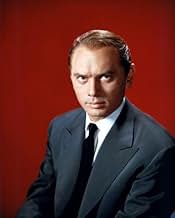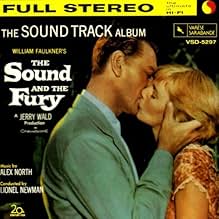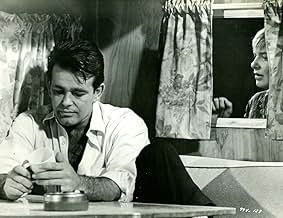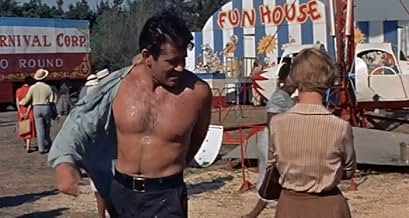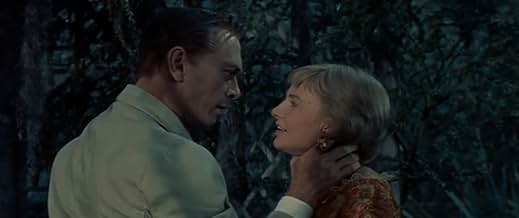IMDb RATING
6.2/10
1.1K
YOUR RATING
Drama focusing on a family of Southern aristocrats who are trying to deal with the dissolution of their clan and the loss of its reputation, faith, fortunes, and respect.Drama focusing on a family of Southern aristocrats who are trying to deal with the dissolution of their clan and the loss of its reputation, faith, fortunes, and respect.Drama focusing on a family of Southern aristocrats who are trying to deal with the dissolution of their clan and the loss of its reputation, faith, fortunes, and respect.
- Director
- Writers
- Stars
Steven Perry
- Luster
- (as Stephen Perry)
Bill Gunn
- T.P. - Dilsey's Grandson
- (as William Gunn)
Jean Carson
- Mary Ellen
- (uncredited)
William Challee
- Roustabout
- (uncredited)
Esther Dale
- Mrs. Maud Mansfield
- (uncredited)
Walt Davis
- Townsman
- (uncredited)
Gary Diamond
- Boy
- (uncredited)
- Director
- Writers
- All cast & crew
- Production, box office & more at IMDbPro
Featured reviews
Watching this adaption of William Faulkner's The Sound And The Fury I can only wonder he must have thought of this abortion of his work. This film seems to have been influenced by Harold Robbins more than Faulkner.
For one thing the novel is a far better subject for a mini-series as it takes place over a couple of generations and is written from several points of view, not the straight linear narrative we get here. Secondly the novel was updated to present day meaning 1959 Mississippi. The civil rights era was on in Mississippi in 1959 and the attitudes expressed here would have been lost in 1959. The novel came out in the late Twenties and some of the action went back a generation earlier.
These Compsons are one dissolute bunch and the only one of the family holding them together is Yul Brynner as Jason because heaven forfend he realizes they're not rich any more and that big mansion has gas and electric bills that need paying. He actually works for a living. The hope of the family may be Joanne Woodward as Quentin who is the illegitimate daughter of the most dissolute of all the Compsons Margaret Leighton.
Leighton has been living away from the family and the genteel Mississippi folks she's been brought up with because of her disgrace with Woodward's birth. But she comes back and that sets off a whole chain of events that causes everyone to reevaluate how things are going for the Compsons.
Ethel Waters did her last role in The Sound And The Fury as the family maid. Her family even in the servile position that blacks had in Mississippi in those days is still stronger than the Compsons even Yul Brynner. Too bad no musical number got worked into the script for her.
The cast is a superbly talented one and they do their best with a hard to recognize Faulkner work, but the film as a whole comes up way short.
For one thing the novel is a far better subject for a mini-series as it takes place over a couple of generations and is written from several points of view, not the straight linear narrative we get here. Secondly the novel was updated to present day meaning 1959 Mississippi. The civil rights era was on in Mississippi in 1959 and the attitudes expressed here would have been lost in 1959. The novel came out in the late Twenties and some of the action went back a generation earlier.
These Compsons are one dissolute bunch and the only one of the family holding them together is Yul Brynner as Jason because heaven forfend he realizes they're not rich any more and that big mansion has gas and electric bills that need paying. He actually works for a living. The hope of the family may be Joanne Woodward as Quentin who is the illegitimate daughter of the most dissolute of all the Compsons Margaret Leighton.
Leighton has been living away from the family and the genteel Mississippi folks she's been brought up with because of her disgrace with Woodward's birth. But she comes back and that sets off a whole chain of events that causes everyone to reevaluate how things are going for the Compsons.
Ethel Waters did her last role in The Sound And The Fury as the family maid. Her family even in the servile position that blacks had in Mississippi in those days is still stronger than the Compsons even Yul Brynner. Too bad no musical number got worked into the script for her.
The cast is a superbly talented one and they do their best with a hard to recognize Faulkner work, but the film as a whole comes up way short.
OK...this is one of the WORST adaptations of all time. For those who say "it's BETTER than the original novel"...are you MAD!!! Faulkner's "The Sound and the Fury" is one the the greatest American novels ever written (just because it can't be read by someone with a 5th grade education doesn't mean it isn't any good). The only thing this film has in common with the novel is the title and the names of the characters. Overall...it it dreadful, and fans of the novel are encouraged to stay away from it.
Oh...and who's brilliant idea was it to cast Yul Brenner as Jason. UGH!
Oh...and who's brilliant idea was it to cast Yul Brenner as Jason. UGH!
This is "based on" William Faulkner's classic novel, The Sound and The Fury. If you were wondering how they managed to get the nifty incomprehensible narrative onto the big screen...they didn't, instead opting for all the clichés of the Steamy South.
Of the two Quentins in the novel, the filmmakers decided to do away with male Quentin and instead focus on Caddy's illegitimate daughter. This did not upset me as much as it does some fans of the novel- all Quentin really does is lust after his sister. The scene in which the incestuous desire is most apparent is transposed to the big scene, except it's girl Quentin (Joanne Woodward) being forced to say her sleazy travelling circus artist's name by her "uncle" Jason (Yul Brynner).
In this film, the novel is re-done as Quentin's coming-of-age. Jason is now adopted rather than being her blood uncle so the writers can have their cake and eat it. Quentin is Jason's only hope to save his adopted family's good name: his adopted sister Caddy (Margaret Leighton)is an ageing nympho; one brother is an alcoholic; and the other one, Benjy, is a mentally-retarded mute. The parents were no good either.
It's almost a parody of Southern Literature: nymphos, lushes, incest, lust, and it's quite entertaining on this level. However, the casting choices were poor. Joanne Woodward has a lovely Southern accent but she was pushing thirty when she played seventeen-year-old Quentin, making her look more like an idiotic woman rather than a schoolgirl (although this family are a bunch of misfits). Yul Brynner does not exactly come to mind when you think of a Southern brute but he is suitably brutish and sensual. Jason in the book was hardly sensual but the film-makers need their romance.
Margaret Leighton isn't that bad as Caddy. It's not clear why her brothers would be so infatuated with her but she fills the role of decadent mother quite well.
Whoever is playing the travelling circus man is risible, as is the person who wrote the dialogue. We get a bunch of clichés, pseudo-meaningful lines and illogical flirtation. It all looks like somebody filmed a dud Tennessee Williams play.
If you're looking to punish a student too lazy to read the novel, please show them this film. Unless you desperately need your fix of steamy Southern melodrama, I would return to Tennessee Williams. Poor William Faulkner must have got a bit of a shock when he saw this.
Of the two Quentins in the novel, the filmmakers decided to do away with male Quentin and instead focus on Caddy's illegitimate daughter. This did not upset me as much as it does some fans of the novel- all Quentin really does is lust after his sister. The scene in which the incestuous desire is most apparent is transposed to the big scene, except it's girl Quentin (Joanne Woodward) being forced to say her sleazy travelling circus artist's name by her "uncle" Jason (Yul Brynner).
In this film, the novel is re-done as Quentin's coming-of-age. Jason is now adopted rather than being her blood uncle so the writers can have their cake and eat it. Quentin is Jason's only hope to save his adopted family's good name: his adopted sister Caddy (Margaret Leighton)is an ageing nympho; one brother is an alcoholic; and the other one, Benjy, is a mentally-retarded mute. The parents were no good either.
It's almost a parody of Southern Literature: nymphos, lushes, incest, lust, and it's quite entertaining on this level. However, the casting choices were poor. Joanne Woodward has a lovely Southern accent but she was pushing thirty when she played seventeen-year-old Quentin, making her look more like an idiotic woman rather than a schoolgirl (although this family are a bunch of misfits). Yul Brynner does not exactly come to mind when you think of a Southern brute but he is suitably brutish and sensual. Jason in the book was hardly sensual but the film-makers need their romance.
Margaret Leighton isn't that bad as Caddy. It's not clear why her brothers would be so infatuated with her but she fills the role of decadent mother quite well.
Whoever is playing the travelling circus man is risible, as is the person who wrote the dialogue. We get a bunch of clichés, pseudo-meaningful lines and illogical flirtation. It all looks like somebody filmed a dud Tennessee Williams play.
If you're looking to punish a student too lazy to read the novel, please show them this film. Unless you desperately need your fix of steamy Southern melodrama, I would return to Tennessee Williams. Poor William Faulkner must have got a bit of a shock when he saw this.
"The Sound and the Fury" from 1959 is based on the novel by William Faulkner, and from what I understand, it's pretty loosely based.
I can't speak for the book, but the film is certainly derivative, reminiscent in some of its themes of "A Streetcar Named Desire," and even "Gone with the Wind," as it deals with the idea of the old, gentile south versus the new south.
Yul Brynner is Jason Compson, head of the Compson family, and guardian of Quentin (Joanne Woodward), whose mother Caddy (Margaret Leighton) took off years earlier. As a result, Quentin is a troubled young woman, looking for love in all the wrong places and trying to break from her family. The rest of the family is your typical southern dysfunctional - Ben, the slow brother who doesn't talk, and Howard (John Beal), the alcoholic brother. I had a little trouble putting the family together - Ben, Howard, and Caddy are all siblings, and Quentin is Caddy's daughter; I guess Jason is a half-brother or stepbrother, evidently from Russia. Anyway, Jason is the brains of the outfit, determined to drag the family kicking and screaming into the 20th century and providing for them.
Caddy returns to the house with Jason's permission, and Quentin, who has needed a mother and waited her entire life for her mother to return, finds she's not much use. Caddy as played by prominent Broadway actress Leighton is Blanche Dubois, dragging herself home to Belle Reve. She is either a nymphomaniac or just promiscuous; my money's on the former.
The story seems to have been reduced to stereotypes and follows along with several films made at that time, including "The Long Hot Summer" and "Cat on a Hot Tin Roof." Except for his accent, Yul Brynner gives a solid performance - mysterious, magnetic, and a dominant presence, and Woodward is excellent as Quentin, a young woman trying to find herself. Ethel Waters gives a wonderful performance as the housekeeper, Dilsy, who has seen all the children grow up and is smarter than all of them.
Just okay.
I can't speak for the book, but the film is certainly derivative, reminiscent in some of its themes of "A Streetcar Named Desire," and even "Gone with the Wind," as it deals with the idea of the old, gentile south versus the new south.
Yul Brynner is Jason Compson, head of the Compson family, and guardian of Quentin (Joanne Woodward), whose mother Caddy (Margaret Leighton) took off years earlier. As a result, Quentin is a troubled young woman, looking for love in all the wrong places and trying to break from her family. The rest of the family is your typical southern dysfunctional - Ben, the slow brother who doesn't talk, and Howard (John Beal), the alcoholic brother. I had a little trouble putting the family together - Ben, Howard, and Caddy are all siblings, and Quentin is Caddy's daughter; I guess Jason is a half-brother or stepbrother, evidently from Russia. Anyway, Jason is the brains of the outfit, determined to drag the family kicking and screaming into the 20th century and providing for them.
Caddy returns to the house with Jason's permission, and Quentin, who has needed a mother and waited her entire life for her mother to return, finds she's not much use. Caddy as played by prominent Broadway actress Leighton is Blanche Dubois, dragging herself home to Belle Reve. She is either a nymphomaniac or just promiscuous; my money's on the former.
The story seems to have been reduced to stereotypes and follows along with several films made at that time, including "The Long Hot Summer" and "Cat on a Hot Tin Roof." Except for his accent, Yul Brynner gives a solid performance - mysterious, magnetic, and a dominant presence, and Woodward is excellent as Quentin, a young woman trying to find herself. Ethel Waters gives a wonderful performance as the housekeeper, Dilsy, who has seen all the children grow up and is smarter than all of them.
Just okay.
Leonard Maltin describes this film as a "strange adaptation" of the rather dense and difficult William Faulkner novel of the same name. Perhaps the lesson here is that the book is indeed unfilmable. The movie takes numerous liberties with the novel and generally omits large portions of it. I can't help but feel that Yul Brynner, with his peculiar accent, was miscast as Jason Compson. In the book, Jason is the youngest sibling of Caddy and Benjie; here he is described as an adopted son, and not "blood" kin. We also have a completely made up sibling named Howard, who does not exist in the book. The novel takes place in the late 1920's with many flashbacks, here the present day is the mid 1950's. Despite its shortcomings, including a rather overbearing and jazzy music score which doesn't really fit, The Sound and The Fury does have its merits, starting with the always watchable Joanne Woodward as young Quentin Compson, presumably around 18 years of age and still in high school. The photography was fine and the ambiance, both inside and out, of the deteriorating Compson mansion was spot on. The small town atmosphere of Jefferson, MS was captured nicely. I would recommend this film to Faulkner buffs and Joanne Woodward fans. Just don't expect too much.
Did you know
- TriviaEthel Waters' final film.
- GoofsWhen Caddy and Quentin are talking in Caddy's bedroom, the shadow of the boom mic is visible in the mirror above the dressing table.
- Quotes
Jason Compson: Anybody could make you feel like a woman!
- ConnectionsReferenced in Family Ties: The Homecoming (1983)
- SoundtracksKingdom Coming
(uncredited)
aka "The Year of Jubilo"
Music by Henry Clay Work
Played by the marching band
- How long is The Sound and the Fury?Powered by Alexa
Details
- Release date
- Country of origin
- Language
- Also known as
- William Faulkner's The Sound and the Fury
- Filming locations
- Production companies
- See more company credits at IMDbPro
Box office
- Budget
- $1,710,000 (estimated)
- Runtime
- 1h 50m(110 min)
- Color
- Aspect ratio
- 2.35 : 1
Contribute to this page
Suggest an edit or add missing content



